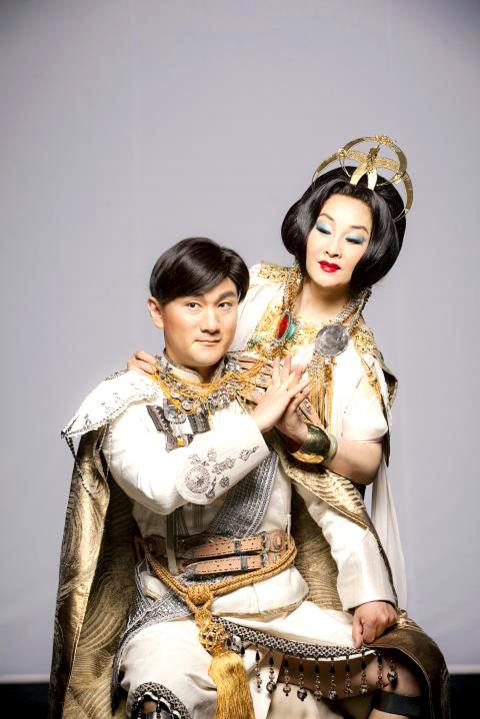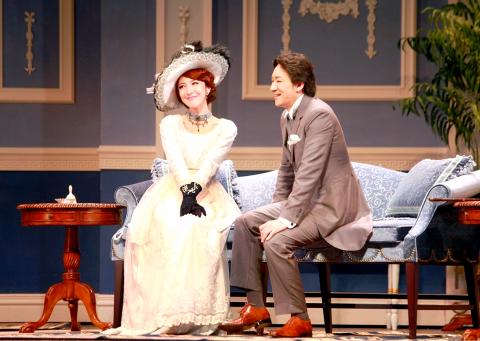One of the buzzwords in theater this year has been the term “fixed title theater” (定目劇), which has been used to describe the creation of big shows with long runs that are able to attract tourists and locals looking for theatrical entertainment, but who aren’t necessarily regular theater goers. Strictly speaking, this term is translated as “repertory theater,” but the idea is very different from what repertory connotes in the English theatrical tradition. One of the highlights that has been created as a result of the promotion of this type of production has been Contemporary Legend Theater’s (當代傳奇劇場) Legend Opera II series, a series of over 60 performances at the Auditorium of the Chiang Kai-shek Memorial Hall.
The Legend Opera II series is a new format for the theatrical group, mixing up straight performances of Beijing opera classics with modernized shows aimed at appealing to a younger audience. More importantly, some of the shows will be performed by young performers who have aspirations to become the next generation of Beijing opera stars.
Wu Hsing-kuo (吳興國), the founder of Contemporary Legend, has been fearless in finding ways to put Beijing opera in front of audiences outside the tight niche of elderly opera aficionados.

Taipei Times file photo
Other shows, most notably the revival of the social comedy Can Three Make It (三人行不行) by Ping Fong Acting Troupe (屏風表演班), which was staged as part of the Huashan Living Arts Festival (華山藝術生活節), proved that for productions that somehow manage to hit exactly the right note, it is possible for long-running shows to make a respectable box office showing. Unfortunately, the number of such shows has proved consistently small, and tends toward a kind of live vaudeville format that is not easily exportable.
Can Three Make It was one of many highlights at the Huashan Living Arts Festival (華山藝術生活節), which showcased a vast array of local theater, music, visual arts and cinema, and which took place at the Huashan 1914 Creative Park (華山1914) in October.
This year, the event featured over 500 performances, screenings, seminars and workshops and it has already established itself as a major event on Taipei’s increasingly crowded arts calendar, as well as being an important showcase for artists striving for wider audience recognition. In addition to promoting the work of local artists, the festival has also helped Huashan establish itself as a place where art and theater can be found throughout the year, and events there are increasingly able to draw audiences from across a broad spectrum.

Taipei Times file photo
Among big, new productions that premiered in 2012, the season kicked off in March with the massive Cleopatra and Her Fools (艷后和她的小丑們), an interpretation of Shakespeare’s Antony and Cleopatra by the Guo Guang Opera Company (國光劇團). The show featured some of the leading lights of Taiwan’s opera establishment, but in the end it turned out to be nothing more than a solid ensemble piece with one star turn, and with far too much invested in lavish costumes and various incidentals. The result was eye-catching rather than memorable.
Another big-ticket item was the production of Oscar Wilde’s The Importance of Being Earnest (不可兒戲) adapted by Yu Kuang-chung (余光中). The success of the Chinese adaptation owes much to the skill of Yu, who is best known as a poet, essayist and prolific translator. Apart from the verbal pyrotechnics, Yu said that The Importance of Being Earnest was a social satire, and despite the period setting and the razor-sharp banter, the play is rooted in the hypocrisy and vanity that characterized Victorian England — which, when you think about it, mirrors much of contemporary society.

Exceptions to the rule are sometimes revealing. For a brief few years, there was an emerging ideological split between the Democratic Progressive Party (DPP) and Chinese Nationalist Party (KMT) that appeared to be pushing the DPP in a direction that would be considered more liberal, and the KMT more conservative. In the previous column, “The KMT-DPP’s bureaucrat-led developmental state” (Dec. 11, page 12), we examined how Taiwan’s democratic system developed, and how both the two main parties largely accepted a similar consensus on how Taiwan should be run domestically and did not split along the left-right lines more familiar in

This month the government ordered a one-year block of Xiaohongshu (小紅書) or Rednote, a Chinese social media platform with more than 3 million users in Taiwan. The government pointed to widespread fraud activity on the platform, along with cybersecurity failures. Officials said that they had reached out to the company and asked it to change. However, they received no response. The pro-China parties, the Chinese Nationalist Party (KMT) and Taiwan People’s Party (TPP), immediately swung into action, denouncing the ban as an attack on free speech. This “free speech” claim was then echoed by the People’s Republic of China (PRC),

As I finally slid into the warm embrace of the hot, clifftop pool, it was a serene moment of reflection. The sound of the river reflected off the cave walls, the white of our camping lights reflected off the dark, shimmering surface of the water, and I reflected on how fortunate I was to be here. After all, the beautiful walk through narrow canyons that had brought us here had been inaccessible for five years — and will be again soon. The day had started at the Huisun Forest Area (惠蓀林場), at the end of Nantou County Route 80, north and east

Specialty sandwiches loaded with the contents of an entire charcuterie board, overflowing with sauces, creams and all manner of creative add-ons, is perhaps one of the biggest global food trends of this year. From London to New York, lines form down the block for mortadella, burrata, pistachio and more stuffed between slices of fresh sourdough, rye or focaccia. To try the trend in Taipei, Munchies Mafia is for sure the spot — could this be the best sandwich in town? Carlos from Spain and Sergio from Mexico opened this spot just seven months ago. The two met working in the